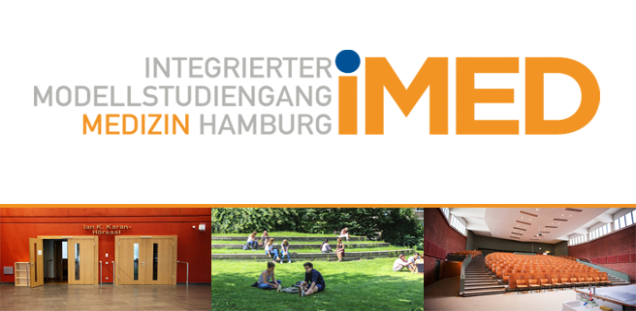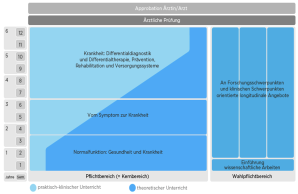Medicine degree program iMED
The medical degree program iMED at the Faculty of Medicine of the Universität Hamburg offers an innovative and integrated teaching concept. Theoretical and practical clinical teaching contents are closely interconnected from the very first year of study and across the entire course of study.
We gradually introduce our students to scientifically sound medical practice. In addition to scientific training, we attach great importance to comprehensive practical and psychosocial skills, which are important for medical work.
-
Objectives of the degree program iMED
The integrated medical degree program iMED is characterised by the guiding principle of "scientific orientation". Our graduates
- have a critical and questioning attitude
- demonstrate awareness of problems and methods
- are able to work independently and in a structured way
- are oriented towards evidence-based science.
At the same time, it is very important to us that in the course of their studies, students acquire the necessary practical skills and abilities as well as psycho-social and communication skills for the medical profession.
How are these goals realised in the iMED concept?
Theoretical and practical-clinical training contents are closely interlinked throughout the entire course of study. The students are trained from three perspectives:
- Practical skills in diagnosis and therapy
- Theoretical basics
- Social interaction with patients and colleagues
The integrated study structure consists of a compulsory core curriculum and a compulsory elective curriculum ("2nd Tracks"). The subjects in the elective area are oriented towards the research profile of the faculty:
- neuroscience research
- cardiovascular research
- tumour research
- health care research and
- inflammation and infection research
By rearranging courses, space has been created for more self-determined learning as well as for in-depth content determined by the interests of students and teachers. The structure of the degree program enables mobility within the framework of the nursing training, clinical training, elective modules and the final practical year. Advisory services and measures for the qualification of the teaching staff, in addition to other quality assurance measures, form an important basis of medical studies at our faculty.
-
Core curriculum
iMED is conducted in a modularized form in 12 semester. The interdisciplinary curriculum comprises compulsory and elective modules and is divided into three study cycles. The second and third cycle repeat similar topics with increasing complexity.
First cycle (semester 1-3): "Normal Function: Health and Disease"
Second cycle (semester 4-6): "From symptom to disease"
Third cycle (semester 7-12): "Disease - Differential Diagnosis and Differential Therapy, Prevention, Rehabilitation and Care"
Semester 1 – 3: "Normal Function: Health and Disease"
Theoretical medical education incl. specific aspects of practical clinical training
Learning objectives:
- Organ-based, modularized and interdisciplinary structure
- Comprehensive understanding of the physiology, anatomy and biochemistry of the human body, and the biology of pathogens
- Psycho-social core competencies (incl. doctor-patient relationship and fundamentals of patient-oriented medicine)
- Linking the theoretical knowledge with case studies and patient presentations
- First aid for medical emergencies
- Introduction to scientific research & fundamentals of critical scientific research
Semester 4 – 6: "From symptoms to disease"
Practical clinical training closely linked to theoretical teaching
Learning objectives:
- Symptom-based, modularized and interdisciplinary structure
- Molecular, microscopic and macroscopic understanding of pathogens, disease and therapeutic principles (pathophysiology, biochemistry, anatomy/pathology, pharmacology, medical microbiology) using standard cases based on emergencies and the most common diseases
- clinical-practical understanding of diseases and their consequences based on standard cases
- In-depth study of the clinical examination, anamnesis, as well as the laboratory-based and basic radiological diagnostics
- Practising constructive and professional care of patients, including special groups (e.g. children, elderly people, patients with migration background)
- Critical scientific thinking based on current research.
Semester 7 – 12: "Disease - Differential Diagnosis and Differential Therapy, Prevention, Rehabilitation and Care Systems”
Practical clinical teaching closely linked to theoretical teachingincluding final practical year (PJ)
Learning objectives:
- Comprehensive understanding of medical practice and clinical competencies
- Predominantly practical clinical teaching
- Additional systematic lectures and seminars with in-depth reference to anatomical, physiological, biochemical, pathological, microbiological, pharmacological and psychosocial knowledge (from year 1-3).
-
Elective curriculum
The compulsory elective curriculum in iMED offers our students the opportunity to learn and apply scientific work in a structured curriculum. This highlights the importance of a scientific approach in medicine. In addition, the students have the opportunity in the compulsory elective area to become acquainted with selected sub-areas of medicine in a methodical and content-related coordinated manner.
-
Application process
For the degree programs medicine, dentistry and pharmacy, you have to apply to the Stiftung für Hochschulzulassung , if you are:
- a citizen of a member state of the European Union (EU)
- a citizen of a member state of the European Economic Area (EEA: Iceland, Liechtenstein and Norway)
- an applicant with a university entrance qualification obtained in Germany or at a German school abroad
- an international applicant living in Germany with relatives who are EU/EEA citizens and work in Germany (e.g. spouse or parents)
If you do not belong to one of the groups listed above, you can find further information on the application procedure for international prospective students on the website of the Campus Center of Universität Hamburg .
For any further questions concerning the application procedure, please contact the Campus Center via the form for international prospective students .Alternatively, you can ask your question using the Campus Center Forum .
For all details on the multi-level application process, please refer to our German website .
-
Contact
If you have any questions about the degree programme, please contact our iMED team .

